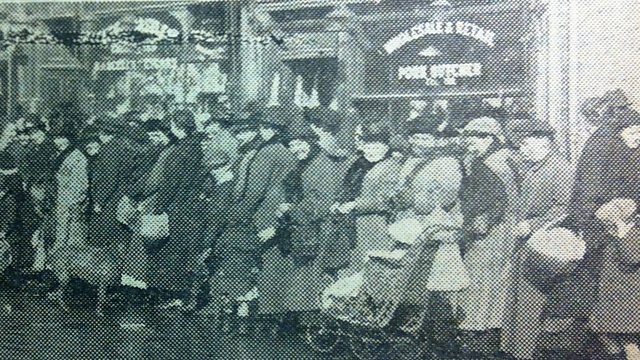Rugby, Warwickshire: Desperate Housewives
Food shortages that led to desperate measures
A group of women in Rugby during World War One were pioneers in consumer power. The war provided a problem on the home front for the housewives of Britain as prices continued to rise. Food shortages sparked food queues, frustration and hoarding.
There was a phrase at the beginning of the war and throughout that women were chancellors of the exchequer in their own homes, they knew what it was like to balance a budget and make sure that their families were fed properly.
Prices increased on all the basics: rent, fuel and clothing as well as food. So what could these desperate housewives do? The Rugby Housewives Committee, and similar groups, were formed. They began to use tactics which were based on the power they had as consumers.
Food became a growing concern about not only availability but quality as well. Many were aware that in Germany there was hunger that led to food riots and soldiers threatening to leave the front.
Food Control Committees were set up for every local authority in the UK and the government said that there must be a woman on every committee; it was recommended that they should be housewives.
Rugby Housewives Committee was set up in 1913, at the beginning of the war, making them one of the first evidenced groups to demand this fairness. Their campaigning, along with many other housewives across the country led to a real change.
By the end of 1917, rationing was introduced – a WW1 invention that is often associated with WW2. It was all about fairness and equality: so that the poor didn’t starve whilst the rich ate.
Location: Rugby, Warwickshire CV21 3BZ
Image: Food queues in Coventry when rationing was imposed, courtesy of Coventry History Centre
Presented by Siobhan Harrison
Duration:
This clip is from
Featured in...
![]()
Food & Drink—World War One At Βι¶ΉΤΌΕΔ
Rationing, supplying the frontline, drinking ...
![]()
Βι¶ΉΤΌΕΔ Coventry & Warwickshire—World War One At Βι¶ΉΤΌΕΔ
Places in Coventry & Warwickshire that tell a story of World War One
![]()
Βι¶ΉΤΌΕΔ Front Life—World War One At Βι¶ΉΤΌΕΔ
Everyday life in the towns, villages and countryside
More clips from World War One At Βι¶ΉΤΌΕΔ
-
![]()
The loss of HMY Iolaire
Duration: 18:52
-
![]()
Scotland, Slamannan and the Argylls
Duration: 07:55
-
![]()
Scotland Museum of Edinburgh mourning dress
Duration: 06:17
-
![]()
Scotland Montrose 'GI Brides'
Duration: 06:41







